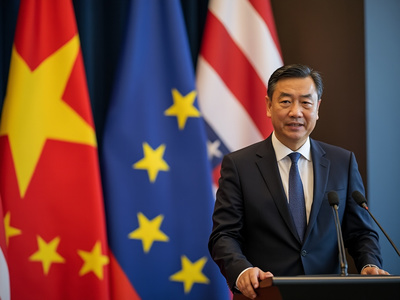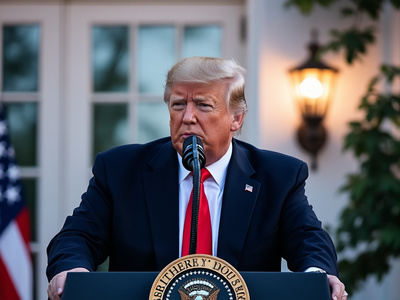
Trump Threatens to Escalate Tariffs on China to 104%
U.S. President's latest tariff proposal comes amid global market turmoil and rising recession fears.
U.S. President Donald Trump has announced plans to escalate tariffs on Chinese goods to unprecedented levels, threatening to raise them to 104% if China does not retract its recently imposed tariffs on U.S. imports.
This announcement comes at a time when global markets are experiencing significant volatility and concerns about a potential recession are mounting.
On Monday, Trump declared via social media that if China does not eliminate its 34% tariff on U.S. goods by April 8, the United States would impose an additional 50% tariff on top of the 34% that he previously announced.
He emphasized that any country that retaliates against the U.S. with increased tariffs would face "substantially higher" tariffs in response.
The potential for such high tariffs raises significant concerns about the costs for U.S. importers.
Current estimates indicate that total tariffs on some products could be as high as 130%.
This could effectively double the cost of imports such as clothing, mobile phones, chemicals, and machinery from China.
In the past year, U.S. consumers purchased approximately $440 billion worth of goods from China, the second-largest source of imports for the U.S. after Mexico.
In conjunction with this tariff threat, Trump indicated that new negotiations with China would be canceled, though he maintained that discussions with other countries could continue.
The move follows significant declines in international stock markets, which were mirrored in the U.S. when trading commenced, with all major indices opening lower for the third consecutive day.
Throughout the morning session, speculation emerged that Trump might consider implementing a 90-day pause on specific tariffs due to requests from nearly 60 countries.
However, the White House promptly dismissed these claims as misinformation, clarifying that no such pause was being sought.
In a press briefing, Trump stated that while some tariffs may be permanent, others could be subject to negotiation.
He characterized the current economic situation as a necessary "medicine" for the economy, despite acknowledging that opinion in the financial sector was shifting towards fears of recession and even stagflation.
Economists from major financial institutions, including Goldman Sachs and JP Morgan, have raised alarms about the increasing likelihood of economic downturns.
Bill Ackman, a known investor and advisor to Trump, remarked on the economic implications of the tariff policy, suggesting it could lead to self-inflicted economic damage.
Larry Fink, CEO of BlackRock, echoed these sentiments, citing widespread belief among executives that the economy may already be in a recession.
Contrarily, prominent figures in the technology sector, including Elon Musk, have voiced opposition to the tariff increases, advocating for free trade and expressing concerns that such measures could be harmful to economic stability.
This announcement comes at a time when global markets are experiencing significant volatility and concerns about a potential recession are mounting.
On Monday, Trump declared via social media that if China does not eliminate its 34% tariff on U.S. goods by April 8, the United States would impose an additional 50% tariff on top of the 34% that he previously announced.
He emphasized that any country that retaliates against the U.S. with increased tariffs would face "substantially higher" tariffs in response.
The potential for such high tariffs raises significant concerns about the costs for U.S. importers.
Current estimates indicate that total tariffs on some products could be as high as 130%.
This could effectively double the cost of imports such as clothing, mobile phones, chemicals, and machinery from China.
In the past year, U.S. consumers purchased approximately $440 billion worth of goods from China, the second-largest source of imports for the U.S. after Mexico.
In conjunction with this tariff threat, Trump indicated that new negotiations with China would be canceled, though he maintained that discussions with other countries could continue.
The move follows significant declines in international stock markets, which were mirrored in the U.S. when trading commenced, with all major indices opening lower for the third consecutive day.
Throughout the morning session, speculation emerged that Trump might consider implementing a 90-day pause on specific tariffs due to requests from nearly 60 countries.
However, the White House promptly dismissed these claims as misinformation, clarifying that no such pause was being sought.
In a press briefing, Trump stated that while some tariffs may be permanent, others could be subject to negotiation.
He characterized the current economic situation as a necessary "medicine" for the economy, despite acknowledging that opinion in the financial sector was shifting towards fears of recession and even stagflation.
Economists from major financial institutions, including Goldman Sachs and JP Morgan, have raised alarms about the increasing likelihood of economic downturns.
Bill Ackman, a known investor and advisor to Trump, remarked on the economic implications of the tariff policy, suggesting it could lead to self-inflicted economic damage.
Larry Fink, CEO of BlackRock, echoed these sentiments, citing widespread belief among executives that the economy may already be in a recession.
Contrarily, prominent figures in the technology sector, including Elon Musk, have voiced opposition to the tariff increases, advocating for free trade and expressing concerns that such measures could be harmful to economic stability.
AI Disclaimer: An advanced artificial intelligence (AI) system generated the content of this page on its own. This innovative technology conducts extensive research from a variety of reliable sources, performs rigorous fact-checking and verification, cleans up and balances biased or manipulated content, and presents a minimal factual summary that is just enough yet essential for you to function as an informed and educated citizen. Please keep in mind, however, that this system is an evolving technology, and as a result, the article may contain accidental inaccuracies or errors. We urge you to help us improve our site by reporting any inaccuracies you find using the "Contact Us" link at the bottom of this page. Your helpful feedback helps us improve our system and deliver more precise content. When you find an article of interest here, please look for the full and extensive coverage of this topic in traditional news sources, as they are written by professional journalists that we try to support, not replace. We appreciate your understanding and assistance.











